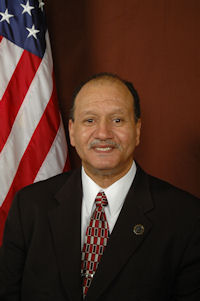What the pandemic has shown us, and where we go from here

Senator Harold M. Metts
We face unprecedented challenges because of the COVID-19 pandemic, which also revealed the alarming disparities faced by our most vulnerable populations. The old adage remains true: “When the economy gets a cold, the Black and Brown community gets pneumonia.” It’s time we examine and correct the unjust socioeconomic, structural and systemic factors that are at the root.
Becky Pringle, vice president of the National Education Association and co-chair of its school to prison pipeline task force, said it well when she said, “Structural racism is actually the preexisting condition that destined us to be where we are; our communities of color are disproportionately impacted by COVID-19.”
The disparities in education, economic development, housing, health care and other areas at the root of the disproportional effects of COVID-19 on minorities have also been exacerbated by it.
Poverty is the elephant in the room that we are now forced to address. An African proverb asks “How do you eat an elephant? One bite at a time.” So where do we start biting the elephant? After decades of efforts to address poverty, my colleague in the House, Rep. Joseph Almeida (D-Dist. 12, Providence), and I decided to concentrate on two areas, education and economic development, knowing that improvement in these two areas would improve the other areas as well.
Continuing to raise the minimum wage with a goal of attaining a living wage are some concrete first steps. I would certainly hope the pandemic has drawn attention to the fact that many essential workers are also among those paid the least. Their pay must better reflect their importance.
Addressing inequity in education so that children have real opportunities for success regardless of their community’s wealth or challenges would be an excellent first step toward improving education. I have been co-sponsoring a bill with Sen. Roger Picard (D-Dist. 20, Woonsocket, Cumberland) for years to put the word “equity” in the state constitution to ensure the equal funding of education. Massachusetts has this in its constitution, and its educational system is a very successful model. Continued refining of our funding formula is needed, too. The bottom line is that a good education should not be based on a student’s ZIP code. Equity, diversity of staff, professional development and mental health support are all important variables.
Thursday, May 7, was the National Day of Prayer. I’ve been praying for our leaders and the right balance to properly address health concerns to reduce infections and deaths; and opening up the economy so people can get back to work. I’m praying for our governor, who is doing a great job. I’m praying that we find the political will to fully and effectively address poverty. I’m praying that we all are part of the solution by continued social distancing, wearing face masks and hand-washing. I’m praying for a vaccine. I’m praying for additional help from Washington to help us balance our state and city budgets. I’m praying for those facing hunger, evictions, foreclosures and bankruptcy. I’m praying that we act accordingly and love our neighbor as we love ourselves and rise above self-centeredness.
Keep the faith because we live in a great country and state and we will get through this together.
Sen. Harold M. Metts is a Democrat who represents District 6 in Providence. A retired school vice principal, he serves as a deacon at the Congdon Street Baptist Church in Providence.
